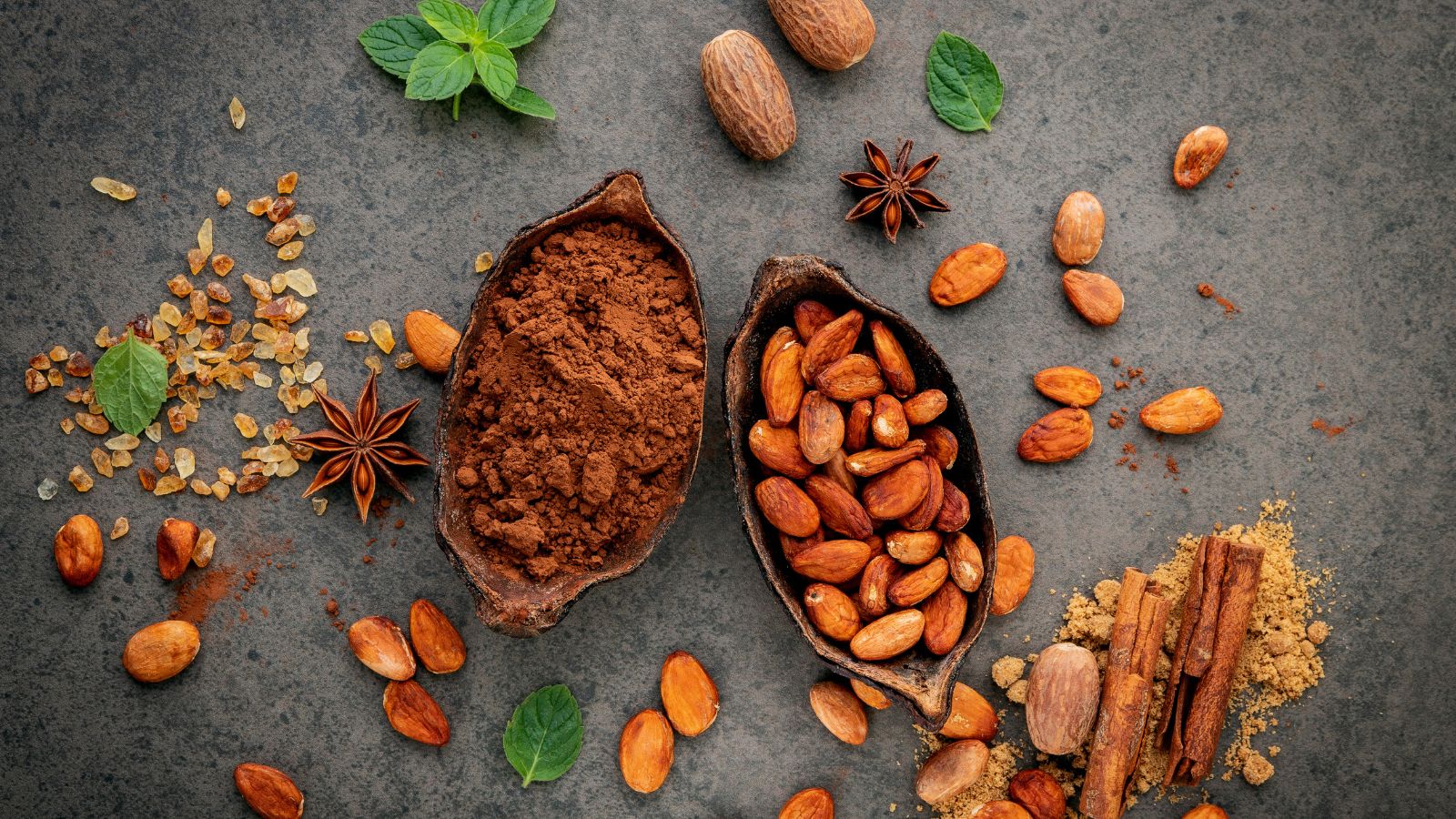
Is Cacao Powder Gluten Free? What You Need to Know
Photo Credit: Canva Pro
People like to put cacao powder in smoothies, baked goods, and desserts because it is a healthy food. You may be wondering, "Is cacao powder gluten-free?" Absolutely, most raw cacao powders don't contain gluten by nature. However, there are differences between brands.
For people who don't eat gluten, this article tells you what to look for, who shouldn't eat cacao, and how to pick safe products.
Is cacao powder gluten free?
Photo Credit: Canva Pro
The fat (cacao butter) is taken out of the cacao bean by cold pressing it, leaving behind a fine powder that is full of nutrients. Cacao powder is naturally gluten-free, but consumers should verify the product's certification and manufacturing practices to ensure it hasn't been cross-contaminated.
What makes a product safe, though, is how it's made and where it's made. When gluten-containing ingredients are packaged or used in the same factory space as other ingredients, cross-contamination can happen.
What Terrasoul Superfoods Says About Gluten in Cacao
People trust Terrasoul, which is known for using minimal processing methods. Their organic cacao powder is certified USDA Organic, dairy free, and naturally gluten free. It is made from cacao beans from Ecuador and Peru, and there is no sugar or filler added at all.
-
Organic assurance: Their powder is USDA Organic and doesn't contain any GMOs.
-
Naturally processed: Made with minimal processing to keep the nutrients.
-
Naturally gluten free: Contains no gluten ingredients and is produced in facilities that minimize cross-contamination risk.
Why It Still Matters to Check Labels and Facilities
If it's made in a factory that also makes wheat, even unsweetened cocoa powder or organic cacao can be harmful.
-
Cross-contamination risk: Some goods are made on equipment that is shared.
-
Certified labeling: Check the label to see if it says "certified gluten free."
-
Safe brands: Pick good sources, like Terrasoul and other gluten-free foods.
Who should not eat cacao powder?
Photo Credit: Canva Pro
Cacao powder is a superfood because it contains healthy fats and antioxidants, but not everyone should eat it. It has caffeine and other chemicals in it that might make some people sick. People who have health problems, allergies, or sensitivities should be careful.
Medical Conditions That May Require Limiting Cacao
Some people may have bad reactions to cacao powder, especially if they eat a lot of it.
-
GERD and acid reflux: Due to being acidic can make symptoms worse.
-
Anxiety or heart issues: It has chemicals in it that can speed up the heart rate or raise blood pressure.
-
IBS or diarrhea: The fibre and caffeine might make you feel bad.
Pregnancy, Children, and Other At-Risk Groups
Cacao powder has a rich chocolate flavor, but it might not be safe for everyone.
-
Pregnancy concerns: Cacao contains caffeine and may contain trace amounts of heavy metals like cadmium or lead.
-
Kids and infants: Caffeine found in cacao powder and hot cocoa can make them sick.
-
Migraine triggers: Some people may get headaches from the chemicals in cacao beans.
Is all cocoa powder gluten-free?
Photo Credit: Canva Pro
Cacao powder and cocoa powder are often used to refer to the same thing, but they are made in different ways. Most cocoa powder has been roasted, but organic cacao powder is still raw and has more nutrients. Neither of them contains gluten by nature, but adding ingredients can change that. If the label isn't very clear, not all gluten-free cocoa powder products are safe.
When Cocoa Powder Isn’t Safe for Gluten-Free Diets
Most unsweetened cocoa powder is safe, but some brands may add fillers or use the same production lines as other brands.
-
Flavored or sweetened mixes: May have thickeners or binders made from wheat.
-
Commercial hot chocolate: Often has ingredients that contain gluten.
-
Manufacturing issues: When people share facilities, gluten could get spread.
How to Choose a Truly Gluten-Free Cocoa Product
If you want to avoid gluten, it's important to choose the right cocoa product. To be sure of safety, look at the list of ingredients and any certifications.
-
Ingredient simplicity: Look for foods that only have cocoa butter and cacao in them and absolutely no sugar.
-
Gluten-free label: Make sure it says "certified gluten free" or is part of a line of gluten-free products.
-
Trusted brands: For chocolate lovers, choose companies that sell high-quality cocoa powder, like those that sell chocolate bars.
What kind of flours are gluten-free?
Photo Credit: Canva Pro
A gluten-free diet can't use all flours. Numerous common choices, like flour made from wheat or barley, contain gluten, which can cause reactions in people who have celiac disease or are sensitive to gluten.
Luckily, there are many naturally gluten-free options for meals, protein shakes, and baked goods.
10+ Gluten-Free Flour Alternatives You Should Know
Making gluten-free and non-GMO recipes often involves using flour substitutes made from nuts, seeds, and roots. Additionally, these flours have special health benefits because they are high in fibre and protein.
-
Almond flour: Usually found in baked goods and made from ground almonds.
-
Coconut flour: Intakes liquid quickly and goes well with almond milk or maple syrup.
-
Teff and sorghum flour: Gluten-free and high in nutrients, ancient grains.
-
Cassava and arrowroot flour: Perfect for making baked goods or pancakes chewy.
-
Oat flour: Quite popular, but it has to be certified gluten-free to keep things from getting contaminated.
You can use these flours separately or mix them together for better texture and flavor when baking. When buying something, always read the label to make sure it wasn't made on the same machines as gluten-containing foods.
Tips for Baking with Gluten-Free Flours
Gluten-free flours behave differently when used in place of regular flour. What you use them for greatly affects the texture and taste.
-
Add moisture: Several gluten-free flours soak up more liquid. Balance out dryness with almond milk, oil, or eggs.
-
Blend flours: Mixing different kinds of flour together often makes the texture and structure better.
-
Adjust baking time: It depends on the flour; some cook faster than wheat flour, while others cook more slowly.
-
Use binders: Proteins like xanthan gum or flaxseed can help replace the structure that gluten gives.
Using gluten-free flour doesn't mean lowering the quality of the baked goods. Recipes can still have a deep chocolate flavor and a satisfying texture if you use the right ingredients together.
What does Fully Healthy offer for gluten-free or cacao lovers?
Fully Healthy is an online store that sells clean foods that are safe for people with allergies. It offers many gluten-free products, like chocolate alternatives that don't contain cacao for people with sensitive stomachs. This platform is trusted by people who don't eat gluten, animal products, or artificial ingredients.
AIP & Gluten-Free Sweet Treats from Fully Healthy
Fully Healthy has tasty and safe options for people who don't want to use regular cacao powder or who want to find an alternative to unsweetened cocoa powder. These are great for people on the Autoimmune Protocol (AIP) diet or who want to avoid other sweets that are high in processed sugars that may be bad for their health.
-
Cacao-free baking mixes: Some cookies and brownies don't use organic cacao but taste like they do.
-
Clean ingredients: Products don't have any animal products, gluten, soy, or dairy in them.
-
Sweetened naturally: Many of the options don't use refined sugar and instead use maple syrup or fruit-based sweeteners.
With these products, you can make hot chocolate, baked goods, and even hot cocoa taste the way they used to, using safe, approved ingredients for special diets.
Why It’s a Go-To Store for Dietary Needs
Fully Healthy does more than sell food. It also helps small businesses and promotes values like fair trade and non-GMO foods. Many of its products are certified fair trade, and it does everything it can to prevent its products from getting contaminated.
-
Allergy-conscious: Their items are carefully chosen so that gluten-containing ingredients don't get mixed in with other foods.
-
Certified and labeled: Many items are certified fair trade, don't contain GMOs, and have easy-to-read allergen labels.
-
No subscription needed: You don't have to feel obligated to buy anything when you shop.
Consumers seeking natural, allergen-conscious alternatives may consider options like those offered by Fully Healthy, though independent certification should always be verified.
Final Thoughts
So, is cacao powder gluten free? Yes, if you buy organic cacao powder or unsweetened cocoa powder in its purest form, it does not contain any gluten. However, always read the labels to see if there are any extra ingredients or signs of contamination.
Pick brands you know you can trust, whether you like hot chocolate, bake with cocoa powder, or add organic cacao to smoothies. If you like chocolate, raw cacao is a naturally bitter food that is high in nutrients and has health benefits.
FAQs
Is cacao powder gluten free and good for hot chocolate?
Yes, cacao powder is gluten-free, and it gives hot chocolate a rich taste.
Is cocoa powder gluten free same as unsweetened cocoa powder?
Yes, unsweetened cocoa powder is typically gluten-free, but it's important to ensure it's not processed on shared equipment with gluten-containing products.
Can I use organic cacao powder in naturally bitter food recipes?
Yes, organic cacao powder works great in recipes needing a naturally bitter food taste.
What’s the difference between cocoa powder and organic cacao?
Cocoa powder is roasted, and organic cacao is raw. Both can be naturally gluten free.
Is cacao powder gluten free safe for chocolate lovers?
Yes, cacao powder gluten free means it's perfect for chocolate lovers wanting clean ingredients.

Leave a comment